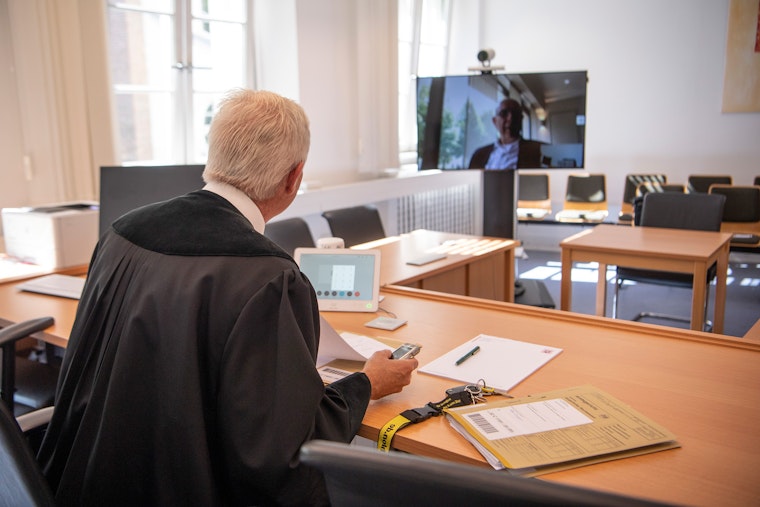A New Guide Highlights How to Provide Effective Legal Services Remotely During COVID-19
By Taegin Reisman

Last year, as the COVID-19 crisis spread worldwide and many countries went into lockdown, legal service providers had to make critical decisions about how they could safely serve their clients and communities. Recent research by The Pathfinders, a group advancing the UN’s Sustainable Development Goals, found that, “the pandemic is widening the justice gap, with a sharp increase in the problems that many people face and the ability of justice actors to respond declining.”
Technology and innovative service delivery models are crucial to begin to bridge this gap. For example, last March, the Ateneo Human Rights Center in Manila, Philippines created a free online legal assistance program that allowed users to submit questions to their Facebook page. Law students and supervising lawyers would screen and prioritize responses, taking into account sensitive issues and making outside referrals, when necessary. The project has since helped hundreds of people receive free legal assistance.
Even before the pandemic, an estimated 1.5 billion people around the world faced a legal problem that they could not resolve. During the pandemic, issues ranging from employment and worker violations to domestic violence have significantly worsened. UN Women has called the increase in violence against women and girls, a “shadow pandemic.” Housing inequality has widened, and the threat of eviction often leaves people in precarious situations to which legal remedies are needed, as recently documented in Open Society Justice Initiative’s publication, Protecting the Right to Housing During the COVID-19 Crisis.
In response to these mounting challenges, the Justice Initiative, DLA Piper’s global pro bono initiative, New Perimeter, and the Legal Empowerment Network launched a new guide for legal service providers who have been forced to adapt their working methods since the pandemic’s outbreak. Providing Legal Services Remotely: A Guide to Available Technologies and Best Practices is a practical resource intended for civil legal service providers around the world, especially rural areas, where in-person meetings have often been challenging, even before the COVID-19 crisis.
Ateneo Human Rights Center’s project is one of five cases studies highlighted in the guide that provide real world examples of how organizations have created effective remote legal service programs. The case studies discuss logistical arrangements as well as the impact of the program with key lessons and takeaways.
The guide provides best practices in three important areas of effective remote legal services:
- Choosing accessible technology: Providing Legal Services Remotely offers an extensive overview of various types of technology available for remote work from videoconferencing and SMS platforms to case management systems to cloud-based call centers while giving recommendations for best practices on how to use such technology. Understanding the uses of each type of platform is necessary, but the guide also highlights limitations to consider, particularly in areas with low internet connections. Some services have yet to upgrade their technology to high accessibility and inclusivity standards that ensure the most diverse audiences can easily use it, including, but not limited to people with disabilities.
- Protecting client data and privacy online: Beyond using videoconferencing for client meetings, there are several other ways to provide critical legal information to communities remotely, including hotlines, online know your rights workshops, and virtual clinics offering legal advice on specific areas of law. Yet, overarching all of these considerations are ensuring that legal service providers uphold ethical obligations, particularly when it comes to privacy and data protection. The guide offers practical advice on using secure communication channels and data encryption, among several other tools to ensure confidentiality is protected.
- Managing access to courts: Lastly, the guide recognizes that there are circumstances due to the pandemic that will be outside the control of legal service providers, particularly restrictions put in place to temporarily close or limit access to courts or government agencies. This affects litigators, but also those seeking government benefits or help on immigration matters. The guide suggests best practices to manage these potential hurdles, including staying informed all of court or agency closures and monitoring new systems implemented for electronic filing of submissions or other legal documents, among others.
There is no doubt the COVID-19 pandemic has significantly exacerbated inequality among and within countries worldwide. Commentators have called the pandemic “an economic wrecking ball, with intergenerational consequences,” and it has laid bare the inequities that exist. This guide will assist legal service practitioners by providing the best tools available to bridge the justice gap, and ensure vulnerable individuals and communities know how to protect their rights and access legal remedies.
The guide is available for download on Namati’s website, here.
Until November 2021, Taegin Reisman was associate operations officer for the Open Society Justice Initiative.